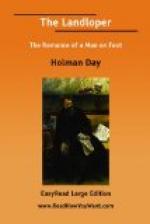Walker Farr sat in his narrow chamber and pored over interlined manuscripts. At last he shook the papers above his head, not gaily, but with grim bitterness.
“That plan will stand law, and no other lawyer ever thought of it!” he cried, aloud. “You’ve got an iron clutch on those cities and towns, Colonel Dodd, but I’ve got something that will pry your fingers loose!” He threw the papers from him and set his face in his hands. “And they ask me who I am and I can’t tell them,” he sobbed.
XXIII
THE PROPHET WHO WAS UNDERRATED
The first sniffer to catch the trail of Walker Farr was the veteran, Daniel Breed, an old political hound who always traveled with muffled paws and nose close to the ground. But when he went to the meeting of the state committee and the Big Boys with his news their reception of him hinted that they suspected he was making up a political bugaboo in order to get a job. He was even told that his services as field man would not be needed in that campaign. And it may be imagined what effect that news had on old Daniel Breed, who had been a trusted pussy-footer and caucus manipulator for a quarter of a century.
“You don’t mean to tell me that you’re trying to slam me onto the scrap-heap, do you?” he demanded. “I’ll scrap before I’ll be scrapped.”
“Look here, Dan, it’s the colonel’s orders,” explained the chairman. “It has been decided to play politics a little more smoothly. There is too much jaw-gab going among the cranks. If there is any outside work done at all it will be put over by new chaps who are not so well advertised as you old bucks. We want to hide the machinery this year.”
“That’s a jobeefed nice thing to say to me, a man that would go up in a balloon and troll for hen-hawks, asking no questions, provided the state committee told me it would help in carrying a caucus.”
“But we’re taking care of the old boys all right, Dan. Vose is in the pension-office; Ambrose and Sturdivant are in the adjutant-general’s office patching up the Civil War rolls, with orders to take their time about it. And you’ll be used well.”
“I want to be in the field,” insisted Breed, ‘sipping’ his lips importantly. “Those fellows are old fuddy-duddies. I’m a natural politician.”
He was an interesting figure, this Honorable Daniel Breed. He was entitled to the “Honorable.” He had been a state senator from his county. With his slow, side-wheel gait, head too little for his body, nose like a beak, sunken mouth, cavernous eyes, and a light hat perched on the back of his narrow head he suggested a languid, tame, bald-headed eagle. And his voice was a dry, nasal, querulous squawk—a sound more avian than human.
“I tell ye there’s yeast a-stirring,” he told the state committee. “There’s a fellow come up out of the Eleventh Ward in Marion that’s some punkins in organizing. He pretends to be a law student in Arch Converse’s law-office. He ain’t a native. I don’t know where he hails from. He ain’t a registered voter as yet. But he’s a man who needs to be trailed.”




